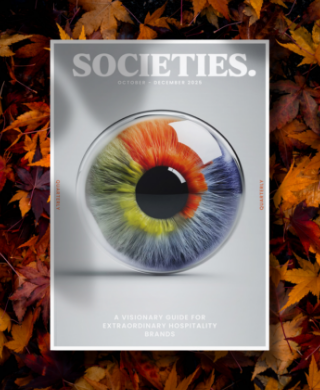Among the speakers were Laurence Devillers, professor at Sorbonne University and director of CNRS’s HUMAAINE Chair; Mila Striukova, professor at SKEMA Business School and specialist in emerging technologies; Mathieu Pollet, co-founder and CEO of LoungeUp; Julien Touraine, Data Expert at The Hotels Network; and Martin Soler, CMO at Shiji Group.

In this article, we share our perspectives on key insights discussed during the event.
Towards augmented hospitality without compromising emotion
Imagine a place where every detail feels uniquely crafted for you—soft lighting upon arrival, staff who greet you by name and anticipate your desires before you voice them. Behind the scenes, from reservation to departure, discreet and almost invisible technology facilitates this harmony. Elegantly integrated AI, never intrusive.
Far from dystopian scenarios, AI can now become a valuable ally for discerning hoteliers, provided it preserves what's essential: emotion, uniqueness, and human interaction. This is augmented hospitality, where digital solutions enhance rather than dilute the soul of a place.
Between innovation and identity: a contemporary dilemma
In a rapidly evolving industry, traveler expectations are shifting towards personalization, fluidity, and immediacy. Ignoring these trends could mean disappearing from the hospitality landscape, especially for boutique and lifestyle hotels. However, thoughtless AI implementation risks standardization—something distinctive properties fear most.
The solution? A strategic approach where technology complements your hotel's narrative. Like a discreet conductor, it enhances the performance without altering the melody.

Rejecting algorithmic standardization
Generative AI relies on patterns: synthesizing, grouping, simplifying. Yet, your guests seek uniqueness—an exceptional experience, not just "another typical stay." In a world saturated with automated content, authenticity becomes a luxury.
Your hotel is a statement. Every space and ambiance tells a story. Leveraging your property's unique qualities, AI can enhance—not dilute—this narrative. For instance, offer tailored recommendations based on local specialties, exclusive partnerships, or signature experiences only your property can provide.

Transforming data into emotion
AI excels at analyzing behavior, reservation history, and implicit preferences. But only your team can convert this data into memorable gestures. Imagine an AI detecting a guest who returns annually during the same period. This year, upon arrival, they find a handwritten note and music playlist inspired by their previous stay.
AI can also enhance online reputation management. By analyzing guest reviews, it reveals whether your brand perception aligns with your intended image. Insights can help identify recurring customer friction points, guiding targeted team training and improving service consistency to align with your brand promise.
Additionally, AI enables personalized digital marketing, enhancing emails and social media communications. The blend of algorithmic precision and human touch creates genuine delight. AI should thus be leveraged primarily to anticipate guests' specific expectations.
Increasing human interactions
Automating routine tasks frees human resources. This is the philosophy of augmented hospitality. AI can handle repetitive queries, streamline check-in processes, and anticipate frequent questions. Your staff, meanwhile, can refocus on what's essential: fostering connections, embodying your brand's promise, and delivering extraordinary experiences.
A chatbot isn't intended to replace concierge services; it merely sets the stage for richer, more intentional human interactions.
Integrating AI according to your brand DNA
Key steps for successful integration include:
- Strategic audit: Is your data accessible and actionable without compromising privacy or experience?
- Selecting specialized tools: Choose technologies designed for upscale hospitality, not generic retail. Ensure system interoperability.
- Team training: AI augments, rather than replaces, your staff.
- Continuous oversight: Test, adjust, measure—always through a human lens and aesthetic sensibility.

H.A.I.: Human-Artificial Intelligence as a new model
At Influence Society, we believe in a hybrid, fluid model where human sensitivity maintains a central role. H.A.I. (Human-Artificial Intelligence) isn’t merely technical positioning but a thoughtful integration strategy putting humans at the core, ensuring technology enhances experiences.
Groups like Experimental, Madame Rêve, and Abbaye des Vaux de Cernay are already boldly exploring these avenues. The future isn't purely digital but lies in the subtle chemistry between human and machine, data and desire, precision and poetry.
Conclusion: Enhance, don't erase
AI shouldn’t be an end in itself but a tool to amplify what makes you unique, provided humans remain central and emotion the ultimate goal. Returning to our initial scenario, guests leave delighted—not only by technological comfort but also by sincere gestures and attentive service from your staff.
📩 To receive early notifications about our next conference on strategic AI use in hospitality, subscribe below or follow us on Linkedin.








